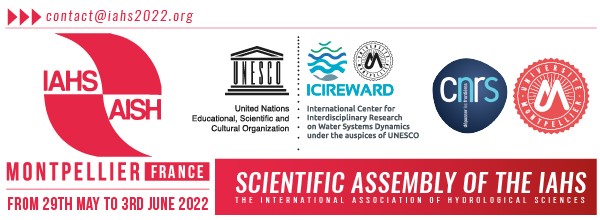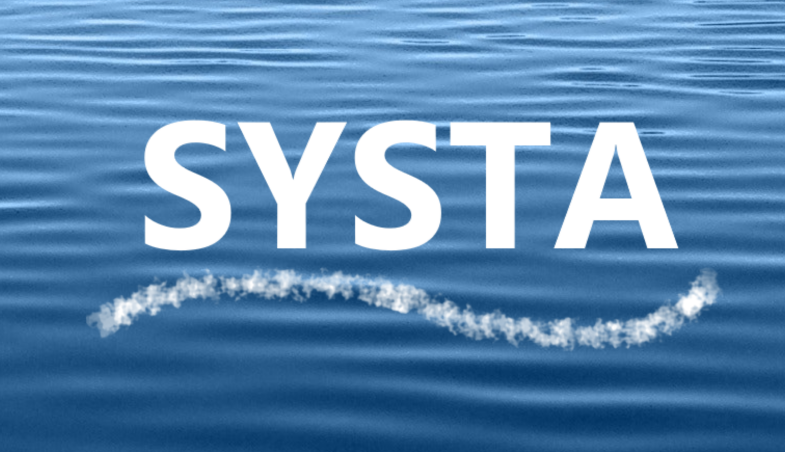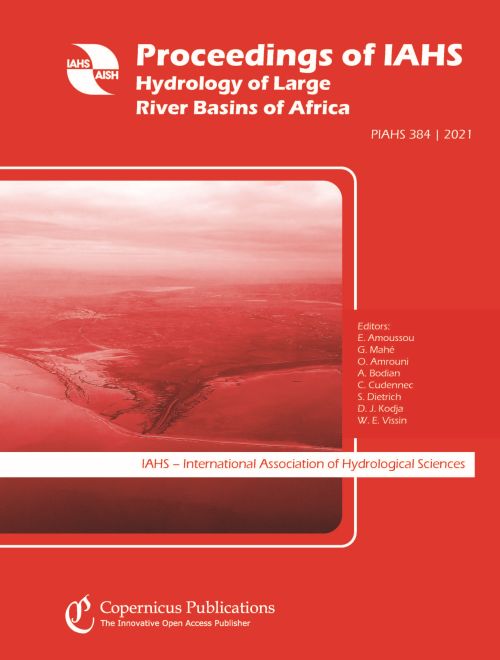IAHS News
IAHS 2022 Scientific Assembly - abstract submission closes TODAY
Submit your abstract via the IAHS 2022 website before 13:00 CET (GMT+1) TODAY (Monday 13 December 2021) !
We would like to remind you that the registration is open and encourage you to book now to benefit from the early bird price.
The IAHS Scientific Assembly will be held from 29 May to 3 June 2022.
In the meantime, please find attached the latest scientific and workshop programmes.
Note the application window for IAHS SYSTA applications for this event has closed.
You can find more information on the IAHS 2022 website or follow the event on Linkedin or Facebook.
IAHS 2022 Scientific Assembly - early bird registration
The IAHS Scientific Assembly will be held from 29 May to 3 June 2022 in Montpellier, France and have three major focuses:
· Panta Rhei decade (2013-2022) on change in hydrology and society
· UPH initiative, "Unsolved Problems in Hydrology"
· the 100th anniversary year of IAHS
The registration platform is open and we encourage you to book soon to benefit from the early bird price (until 27th February).
In the meantime, please find attached the latest scientific and workshop programmes.
Note the application window for IAHS SYSTA applications for this event has closed.
You can find more information on the IAHS 2022 website or follow the event on Linkedin or Facebook.
IAHS 2022 Scientific Assembly - last few days to submit your abstract
IAHS 2022 Scientific Assembly, Montpellier, France - abstract submission closes at 13:00 CET (GMT+1) on Monday 13 December.
We would like to remind you that the registration is open and encourage you to book now to benefit from the early bird price.
The Scientific Assembly will be held from 29 May to 3 June 2022 and have three major focuses:
· Panta Rhei decade (2013-2022) on change in hydrology and society
· UPH initiative, "Unsolved Problems in Hydrology"
· the 100th anniversary year of IAHS
In the meantime, please find attached the latest scientific and workshop programmes.
This event is eligible for IAHS SYSTA travel awards. Note that an abstract must already be submitted to be considered for an award. The closing date for SYSTA applications is 13:00 CET (GMT+1) on 12 December 2021.
You can find more information on the IAHS 2022 website or follow the event on Linkedin or Facebook.
IAHS 2022 Scientific Assembly - abstract submission closes on Monday
IAHS 2022 Scientific Assembly, Montpellier, France - abstract submission closes on at 13:00 CET (GMT+1) Monday 13 December.
We would like to remind you that the registration is open and encourage you to book now to benefit from the early bird price.
The Scientific Assembly will be held from 29 May to 3 June 2022.
In the meantime, please find attached the latest scientific and workshop programmes.
This event is eligible for IAHS SYSTA travel awards. Note that an abstract must already be submitted to be considered for an award. The closing date for SYSTA applications is 13:00 CET (GMT+1) on 12 December 2021.
You can find more information on the IAHS 2022 website or follow the event on Linkedin or Facebook.
IAHS 2022 Scientific Assembly - abstract submission deadline extended
IAHS 2022 Scientific Assembly - abstract submission deadline has been extended to 13:00 CET on Monday 13 December.
We would like to remind you that the registration is open and encourage you to book now to benefit from the early bird price.
The Scientific Assembly will be held from 29 May to 3 June 2022.
In the meantime, please find attached the latest scientific and workshop programmes.
This event is eligible for IAHS SYSTA travel awards. Note that an abstract must already be submitted to be considered for an award.
You can find more information on the IAHS 2022 website or follow the event on Linkedin or Facebook.
IAHS 2022 Scientific Assembly - abstract submission closes on Wednesday so act now
IAHS 2022 Scientific Assembly, Montpellier, France - abstract submission closes this week on Wednesday 1st December so act now to take part!
We would like to remind you that the registration is open and encourage you to book now to benefit from the early bird price.
The Scientific Assembly will be held from 29 May to 3 June 2022.
The call for abstracts will be open until December 1 2021.
In the meantime, please find attached the latest scientific and workshop programmes.
This event is eligible for IAHS SYSTA travel awards. Note that an abstract must already be submitted to be considered for an award.
You can find more information on the IAHS 2022 website or follow the event on Linkedin or Facebook.
IAHS 2022 Scientific Assembly, Montpellier, France - abstract submission closes on 1st December
We would like to remind you that the registration and abstract submission are now open for the IAHS 2022 Scientific Assembly and encourage you to book early.
The assembly will be held in Montpellier, France from 29 May to 3 June 2022.
The call for abstracts will be open until December 1 2021.
In the meantime, please find attached the latest scientific and workshop programmes.
This event is eligible for SYSTA travel awards.
You can find more information on the IAHS 2022 website or follow the event on Linkedin or Facebook.

'Hydrology of Large River Basins of Africa' is now available as PIAHS 384
The papers from the 4th International Conference on the ''Hydrology of the Great Rivers of Africa'' in Cotonou, Benin, November 16-20 2021 are now available online open access as PIAHS 384.
https://piahs.copernicus.org/articles/384/index.html
This conference is the fourth of a series started in 2015 in Tunisia, followed by a second edition in Senegal in 2016, and a third one in Algeria in 2018. As usual this conference is the occasion to organize training courses, side-event workshops, and for the first time a PIAHS volume. This cycle of conferences also refers to the World Large Rivers Initiative launched by UNESCO in 2014 to which it contributes for the continent. The scientific coverage is comprehensive across the global theme of large rivers; ranging from observation, characterisation and modelling of various processes and settings, to the analysis of regimes, changes and security issues. Articles published in that issue, are hence much related to most of the 10 International Commissions of IAHS, and to cross-cutting and agenda-setting initiatives: innovation and assimilation in hydrometry and the data-service value chain, Prediction in Ungauged Basins – PUB, Hydrological change – Panta Rhei and related Water security and nexus approach, and socio-hydrology and citizen engagement. The clustering of the articles in three sections captures that alignment through a progression from hydrological dynamics, to regimes and changes, and to security. The range of African Large Rivers addressed across these articles is a richness as such, with an ultimate value for comparative hydrology; whereas some local studies are also included, which are valuable for documenting knowledge and models.
This open access bilingual issue is of particular interest and value for a large community of authors and readers in Africa, in terms of knowledge capitalization and sharing, both at the regional and international levels, within academia and in the science-policy bridging – as advocated by learned societies and UNESCO in terms of Open Science and public good. Leading authors come from 15 African countries, Canada, France and UK. Beyond these figures, this issue shows the great expectation of African researchers to integrate international institutional activities and share common scientific reflections. This PIAHS volume, as a contribution to the FRIEND-Water program, shortly follows the one published in 2020 out of the Beijing Global FRIEND-Water conference in 2018. The next Global FRIEND-Water conference is scheduled to be held in Dakar, Senegal in March 2023. The contribution of the African scientific community to IAHS activities is strongly increasing, which is also visible by the very large registration of African colleagues to the ongoing 23 UPHs in Africa initiative, whose results should be integrated to the global 23 UPHs discussions scheduled in Montpellier IAHS XIth scientific assembly in May–June 2022.
CALL FOR APPLICANTS — IAHS Early Career Committee
Early Career scientists make up a significant amount of our community, creating an opportunity to include a new generation of hydrologists as active contributors to IAHS.
During its Bureau Meeting in July 2017 IAHS decided to strengthen its early career scientist representation to enable more active participation of those members within IAHS Commissions and Working Groups. An Early Career Committee (ECC) was created consisting of the Early Career Representative of each IAHS Commission plus a chair and co-chair. The first two-year mandate started at the IUGG General Assembly in 2019 and was extended to end at the IAHS Scientific Assembly in Montpellier in 2022.
A call is made for applicants for all Commissions for the second term of three years which commences during the IAHS Scientific Assembly in Montpellier in May 2022.
The IAHS definition of early career embraces scientists up to 5 years after completion of the PhD (allowing for an extra year per child for parents if they took parental leave).
More information on the IAHS Commissions and Early Career Committee is available on the IAHS website.
If you are interested in becoming an Early Career Scientist Representative for one of the IAHS Commissions, you can apply by completing the form by 21 December 2021. The ECC embraces equal opportunity for all its members, and strives to have a diverse composition in terms of gender and geography.
Please don’t hesitate to contact the IAHS secretariat and individuals involved in the commission if you have any questions.
International Hydrology Prize – Call for nominations
The International Hydrology Prize is awarded annually by IAHS, with UNESCO and WMO, to two people who have made an outstanding contribution to hydrological science. More information, including the list of previous awards, is available at
https://iahs.info/About-IAHS/Competition--Events/International-Hydrology-Prize.do
Nominations for the Prize are made by National Committees to IAHS, National Committees to the UNESCO-IHP or National Hydrological Advisors to the WMO, and forwarded to the Secretary General of IAHS for consideration by the Nomination Committee. The Committee consists of the President and a Vice-President of IAHS, as well as representatives from UNESCO and WMO.
Two medals are awarded under the International Hydrology Prize: the Dooge medal and the Volker medal. Both medals are intended to distinguish outstanding achievements by hydrological scientists but with a different focus. The Dooge medal is aimed at fundamental contributions to the science of hydrology, whereas the Volker medal is aimed at outstanding applications of hydrological science for the benefit of society at large.
The following applies to both the Dooge and Volker medals:
- The International Hydrology Prize shall be awarded to persons who have made outstanding contributions to hydrology such as confers on the candidate universal recognition of his or her international stature.
- The contribution should have an identifiable international dimension extending beyond both the country of normal work and the specific field of interest of the candidate.
- The medals may be awarded to hydrologists of long international standing or to younger but active hydrologists who exhibit qualities of international leadership in the science or practice of hydrology.
- An active involvement in the work of IAHS and other international organisations in the field of hydrology should be counted as an advantage.
Specific considerations for the Dooge medal:
- The Dooge medal is particularly intended for hydrologists who have demonstrated scientific excellence, and have made fundamental contributions to the science of hydrology as evidenced by publications in the international scientific literature and other evidence of high standard.
- Preference should be given to candidates who have recently exhibited outstanding international leadership in the science of hydrology.
Specific considerations for the Volker medal:
- The Volker medal is dedicated for hydrologists who have applied their research and hydrological expertise to the benefit of society, addressing issues of public interest and development.
- Applications of hydrology to the benefit of developing countries would count as an advantage.
- Preference should be given to candidates who have contributed through both scientific and practical work, and who have made outstanding contributions to the Hydrology community as demonstrated by active involvement in the work of IAHS or other international hydrological associations.
Nomination format and procedure
Nominations should be received by the Secretary General of IAHS no later than 31 December 2021 – Christophe Cudennec at [email protected] – and consist of:
- a (max. 2, pages A4 format) nomination letter signed by a National Representative to IAHS, the President of a national committee of UNESCO-IHP, or a National Hydrological Advisor to the WMO, with one sentence citation (max. 200 characters), and stating why the nominee is the most qualified person to receive the Volker or Dooge medal, paying attention to the medal's dedication specified above;
- the nominee’s CV (max. 3 pages, A4 format) with an emphasis on the contribution to hydrological science and international scientific cooperation, providing clear information on the main criteria used for the evaluation and the specific considerations mentioned above.
- a list of the major scientific publications (max. 2 pages, A4 format).
Nominations are expected from the world diversity, and equally for female and male candidates.
Evaluation criteria
a) Outstanding contributions to hydrology evidenced by universal recognition of his or her international stature.
b) Identifiable contributions with international dimensions extending beyond both the country of normal work and the specific field of interest of the candidate.
c) For senior candidates proof of Hydrologists activities of long international standing, or for younger candidates, proof of being active hydrologists with qualities of international leadership in the science or practice of hydrology.
d) Active involvement in the work of IAHS and other international organizations in the field of hydrology is counted as an advantage.
e) Application of the hydrological research performed and the use of his/her expertise to the benefit of society and addressing issues of public interest and development.
f) Applications of hydrology to the benefit of developing countries counts as an advantage.


